#diceless rpg
Explore tagged Tumblr posts
Text
Added ten more community copies of Nowhere Home. Go forth, my friends, and have emotional journeys as outcast monsters!
#belonging outside belonging#wanderhome#nowhere home#vampire rpg#werewolf rpg#GMless rpg#diceless rpg
23 notes
·
View notes
Text
Daily Diceless: Arcane Academy
Play as a gang of magical misfits taking their first steps into the world of Hexenview Academy. Make new friends and avert disaster as you uncover one another's secrets.
3 notes
·
View notes
Text
Have you played The Slow Knife ?
By Jack Harrison
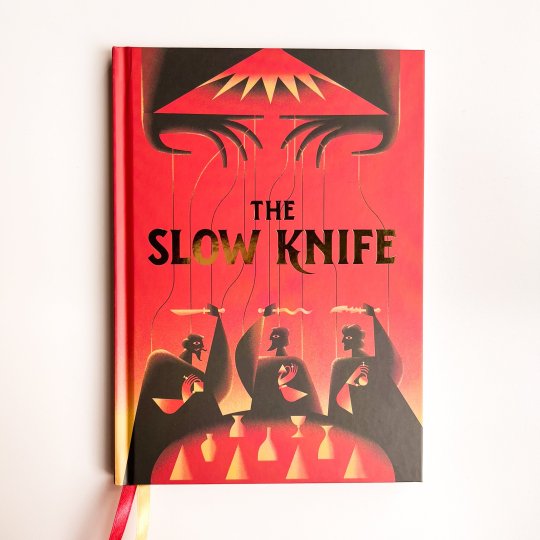
A card-based story game of wretched scoundrels and patient revenge for 2-4 players.
The Slow Knife is inspired by stories like The Count of Monte Cristo, where a simple death is too good for all those years the villains took from their victim. This isn't a John Wick-style action flick, no—this is curt whispers over fine wine, jewelled masks of jade and bone, half-buried scandals and half-heard truths, and yes - sometimes - a quiet blade in the dark.
You'll establish a promising young soul whose life is ruined by a handful of grasping scoundrels, then you'll tell the decades-long story of the victim's overdue and inevitable vengeance. You'll tell this story from the perspective of the villains, with the protagonist - The Knife - moving in the shadows or behind disguises.
You'll answer card prompts about your villain's life as you add notes and connections to a pinboard of sin and scandal.
79 notes
·
View notes
Text
What's this?! Two games in a month?! Actually, this one has been sitting for a moment but I wanted to release the playtest to a wider audience. In Split Soul, you play as an elemental trying to stitch the reality of you and your reality back together. Play as two characters, two pieces of the same whole and walk through a broken world. Written on the DICE system means you will need two decks of cards, one for the GM and the other for the players. Future Vision of the game is to release more playbooks, more professional art, and any other bumps in the road that need smoothing



#ttrpg#indie ttrpg#ttrpgs#ttrpg stuff#tabletop gaming#ttrpg community#table top role playing game#indie ttrpgs#indie tabletop rpg#diceless ttrpg
11 notes
·
View notes
Text
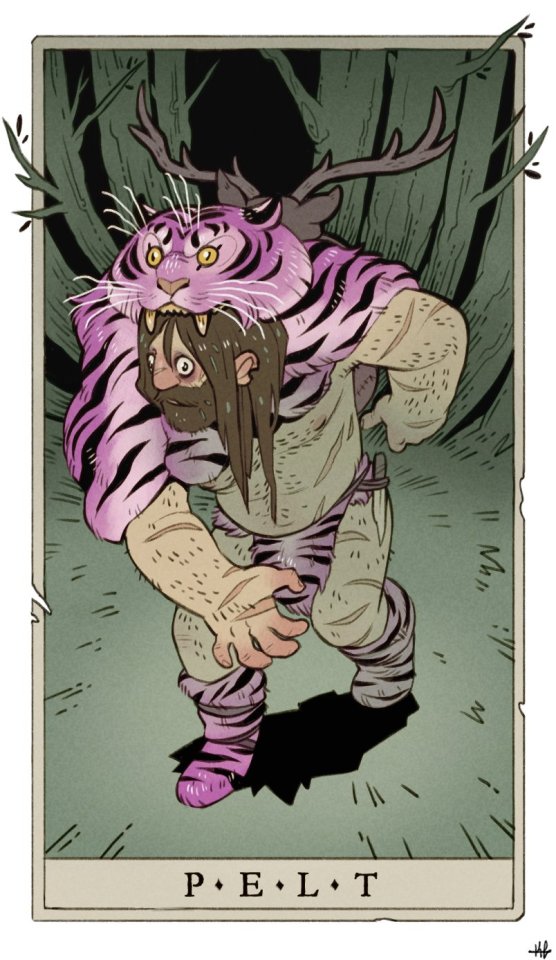
Just finished a 3 year long Amber Diceless RPG campaign. This is my character Pelt - a demigod who was abandoned in the wilderness as a child, only to be rediscovered 200 years later after he had long-since gone feral.
Uneducated and unprepared, he was taken to a kingdom at the edge of the multiverse and wrapped up in courtly politics. In his adventures, he made many friends and met long-lost relatives. He got into plenty of fights, earned a fair few amount of scars, he loved, he grieved, and he learned of the powers and responsibilities that come with being a scion of the most powerful family in the multiverse. And he learned of the atrocities that can be committed by people with such power.
And in the end, he returned to his home in the wilderness. No longer a scared, desperate child trying to survive, but as its warden and protector. The Untamed King of the Deep Wilds.
I had a ton of fun with this guy, it was an amazing campaign. I'm more than a little sad that his story is over, but it was a fantastic ride.
Art by the inimitable @carniekisses, who drew Pelt (and his cousins, the other player characters) for us at the beginning of the campaign.
3 notes
·
View notes
Text
A reminder that I also run several side blogs revolving around ttrpg goodness!
A Forged in the Dark blog celebrating everything FitD (from character art to whole games!)
A blog dedicated to diceless ttrpg.
Small Adventures, a blog for one page and pamphlet sized rpgs. Currently doing a daily 'Small Spotlight' on different games!
19 notes
·
View notes
Text
Daily Diceless: Loot
Explore the world and fight monsters in this LUMEN 2.0 game where your capabilities are entirely dictated by the loot you carry with you!
0 notes
Text
The two I'm most familiar with are Chuubo's Marvelous Wish-Granting Engine and Glitch, both by Dr. Jenna Moran. Her earlier work Nobilis is also diceless, but I'm still on my first readthrough of the rules.
While the specifics vary quite a lot, randomized results are replaced by spending points from limited pools. Characters that are better at certain things usually need to spend fewer points for the same results. You always get the result you pay for; a lot of the depth comes in deciding whether you can afford the result you want.
In Chuubo's Marvelous Wish-Granting Engine, the results of your actions are tied to the "Intention Ladder". Higher numbers for an Intention (action, or set of related actions) have better results. Intention 0 is pretty much failure, an attempt that did nothing or even made things worse. Intention 2 is enough to "accomplish a task; have a tangible impact on the world." All the way up at Intention 8 you can "do something really productive" that makes your life much better.
The primary resource is called Will. It refreshes on a regular basis. Will can be spent to increase the level of an Intention. You add any Will spent to your skill level, and subtract the level of any Obstacles in your way. People with high skills don't usually have to spend Will to get useful results; people without a relevant skill have to make due with spending more Will.
Uncertainly enters the system in two ways: you don't necessarily know the Obstacle rating for your Intention up-front, and you don't know if you'll need to set another Intention for something else later.
There are also Miracle Points used to power other, more specific, abilities. A miracle does exactly what it says and doesn't usually interact with Will and Intentions directly. Miracles might implicitly reduce the Obstacle an action faces though; most people don't have a way to make sunbeams break through the clouds to shine on their friends in a moment of hardship, but the Child of the Sun can invoke one of their miracles to do so.
Glitch: A Story of the Not, uses specific mechanically-defined actions instead of the Intention Ladder. Every action has an Action Level. Actions of a higher level are generally either more powerful or more helpful, if you can think of a way to apply them.
Each Action is tied to an Attribute. Actions up to your level in the relevant attribute are free, but to push yourself beyond that you have to pay a Cost equal to the difference. In cases of direct conflict (I stab him! Nuh-uh I obliterate you first!), the action with the higher Action Level usually wins. When in doubt, you can end up in a bidding war to see who's willing to spend more Cost to push their effective Action Level higher. Longer conflicts might have a specific overall Cost threshold the party needs to hit or just go to whichever side spent more Cost overall before time ran out. (Assuming they aren't ended earlier through the narrative).
Each Attribute has its own associated Cost. In general you can only power up an action by spending from the associated pool. You might be too worn-out to do your taxes, but still have enough void-juice to hurl the entire tax office screaming into the Beyond.
"Taking Damage" also spends points of an associated cost. In effect, every action you take that isn't free is "cast from Hit Points."
Unlike Will, the Costs do not fully refresh themselves on a set cadence. They recover slowly over time, or sometimes in larger chunks when you complete character goals. Alternatively you can take a Wound to recover a larger chunk all at once. Wounds have narrative consequences, and taking too many Wounds over the course of a campaign is the only way to perma-die.
Uncertainly now enters in three ways:
Is this important enough for me to spend a campaign-limited resource on?
How much do I need to spend to overcome my opposition, without going too far overboard?
Uh-oh, the conflict seems to be winding down without a decisive winner. Have I bled for this? Have I spent enough to win?
I've only briefly played Glitch and haven't had a chance to play Chuubo's, but my impression is the different refresh mechanics for an ultimately similar system (spend points to do better, skills add to points spent) lead to very different incentives and ways to think about using your limited resources. Neither require dice to provide uncertain outcomes; your own evaluations of the situation and what's important to your character provide all the uncertainly you could need.
Reading some of my notes apparently a lot of people feel that they would benefit from someone sitting their asses down and learning them some probability, and to be fair tabletop RPG math isn't so complex that even an English major like me couldn't explain it in such a way that most people would understand it.
Anyway on a completely different note, the funny thing in my experience is that even if you explain the numbies and how to arrive at them, at the end of the day most people are really bad at actually interpreting those numbies. Even in percentile-based systems where your exact chances out of a hundred are made immediately obvious (a 47% chance is a forty-seven per centum [New Latin for "by the hundred"] chance) most people fall on a number of probability-based fallacies whose names I can't remember but I think Gambler's fallacy is at least one of them. Anyway what I mean is that when a number is higher than 50% it should succeed more often than fail, so like guy who has a 55% chance of succeeding voice why do I keep failing 45% of the time
3K notes
·
View notes
Text
Trans made TTRPGs
Due to… recent events that I would rather not talk about, today's post is a highlight of different tabletop games made by trans peeps! These games are fantastic in their own right, of course, but you can also know that they were made by incredibly cool and attractive people
(Also, these are flyover descs of the game, they'll get more in-depth singular posts later, this is because I am lazy)
Perfect Draw is a phenomenal card game TTRPG that was funded in less than a day on backerkit, it's incredibly fun and has simple to learn hard to master rules for creating custom cards, go check it out!
Songs for the dusk is fucking good, pardon my language, but it's a damn good post apocalyptic game about building community in a post-capitalist-post-apocalypse-post-whatever world. do yourself a favor and if you only check out one game in this list, check this one out, its a beautiful game.
Flying Circus is set in a WW1 inspired fantasy setting full of witches, weird eldritch fish people (who are chill as hell), cults, dead nobility, and other such things. It's inspired by Porco Rosso primarily but it has other touchstones.
Wanderhome is a game about being cute little guys going on a silly adventure and growing as the seasons change, its GMless and very fun
https://weregazelle.itch.io/armour-astir Armour Astir has been featured in here before but its so damn good I had to post it twice. AA demonstrates a fundamental knowledge of the themes of mech shows in a way that very few other games show, its awesome
Kitchen Knightmares is… more of a LARP but its still really dang cool, its about being a knight serving people in a restaurant, its played using discord so its incredibly accessible
https://grimogre.itch.io/michtim Michtim is a game about being small critters protecting their forest from nasty people who wish to harm it, not via brutal violence (sadly) but via friendship and understanding (which is a good substitute to violence)
ok this technically doesn't count but I'm putting it here anyways cuz its like one of my favorite ttrpgs of all time TSL is a game about baring your heart and dueling away with people who you'll probably kiss 10 minutes later, its very very fanfic-ey and inspired by queer narratives. I put it here because its made by a team, and the expansion has a setting specifically meant to be a trans "allegory", so I'll say it counts, honestly just go check it out its good shit
https://willuhl.itch.io/mystic-lilies
Mystic Lillies is a game inspired by ZUN's Touhou Project about witches dueling powerful foes, each other, and themselves. Mystic Lillies features rapid character creation and a unique diceless form of rolling which instead uses a standard playing card deck.
https://preview.drivethrurpg.com/en/product/141424/nobilis-the-game-of-sovereign-powers-2002-edition I… want to do a more general overview on Jenna K as an important figure in indie RPG design, but for now just know that Nobilis is good
https://temporalhiccup.itch.io/apocalypse-keys Apocalypse Keys is a game inspired by Doom Patrol, Hellboy, X-men, and other comics about monstrousness being an allegory for disenfranchisement. Apocalypse Keys is also here because its published by Evilhat so its very cleaned up and fancy but I love how the second you check out the dev's other stuff you can tell they are a lot more experimental with their stuff, this is not a critique, it is in fact a compliment
Fellowship! I've posted about this game before, but it is again here. Fellowship has a fun concept that it uses very well mostly, its a game about defining your character's culture, and I think that's really really cool
Voidheart Symphony is a really cool game about psychic rebellion in a city that really does not like you, the more you discover for yourself the better
Panic at the Dojo is a phenomenal ttrpg based on what the Brazilian would call "Pancadaria", which basically means, fucking other's people shit up. Character Creation is incredibly open and free, meaning that many character concepts are available
Legacy 2e is a game about controlling an entire faction's choices across time, its very fun
remember to be kind to a trans person today! oh also don't even try to be transphobic in the reblogs or replies, you will be blocked so fast your head will spin
#indie ttrpg#ttrpg community#ttrpg indie#ttrpg#trans creator#trans#trans pride#queer#queer creator#perfect draw#wanderhome#songs for the dusk#flying circus#armour astir#michtim#thirsty sword lesbians#mystic lillies#apocalypse keys#fellowship#ttrpg of the day
674 notes
·
View notes
Text
Have you played WANDERHOME
By Jay Dragon
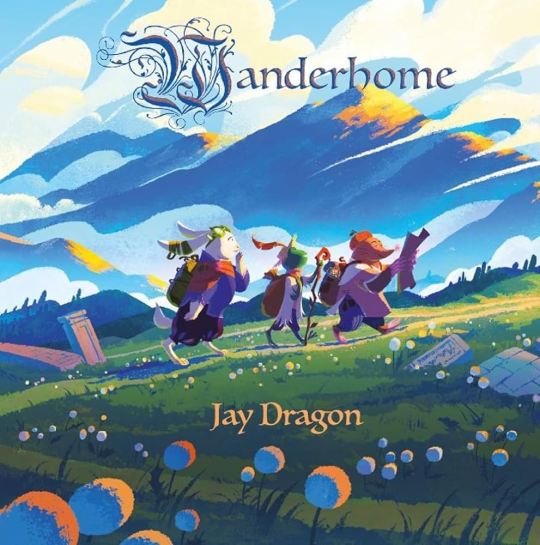
Wanderhome is a pastoral fantasy role-playing game about traveling animal-folk, the world they inhabit, and the way the seasons change. It is a game filled with grassy fields, mossy shrines, herds of chubby bumblebees, opossums in sundresses, salamanders with suspenders, starry night skies, and the most beautiful sunsets you can imagine.
A diceless and GM-less game, built on the Belonging Outside Belonging engine
98 notes
·
View notes
Text
I got bored

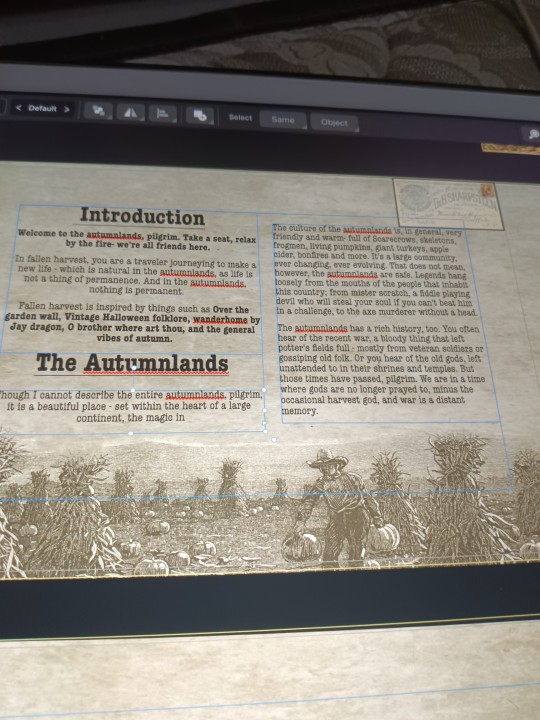

#diceless#gmless#indie games#indie rpg#indie ttrpg#small ttrpg#solo ttrpg#tabletop#tabletop role playing game#tabletop roleplaying
6 notes
·
View notes
Text
Wanna ttrpg with cards instead of dice? Want to create a world and then burn it with your friends? Do you like Enneagrams? Open up a nice deck, gather some friends, and enjoy a GMless dose of Neon Shadows! Play as one of the 9 ennegram based playbooks, create a world with a blank map, and begin to tell the story of your characters as they follow their desires. Will you save the city from a ruthless govt? Maybe trek the wilderness of the world outside the city? Explore old Aether mines? It's your story to tell, how will you tell it?
16 notes
·
View notes
Text
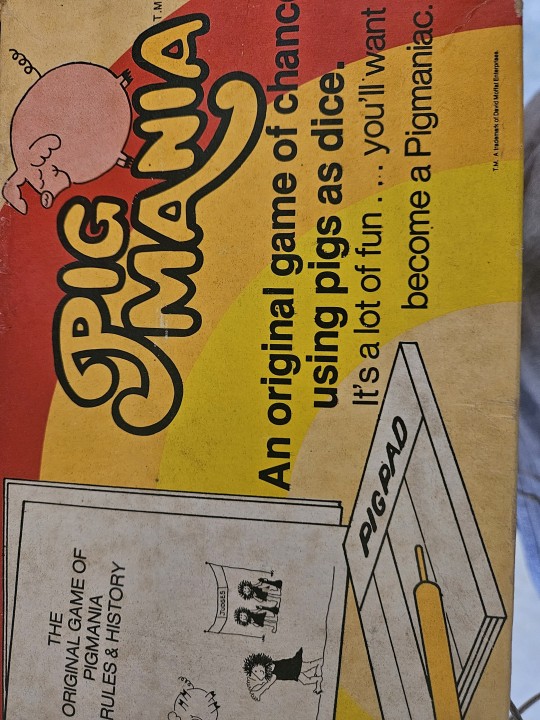
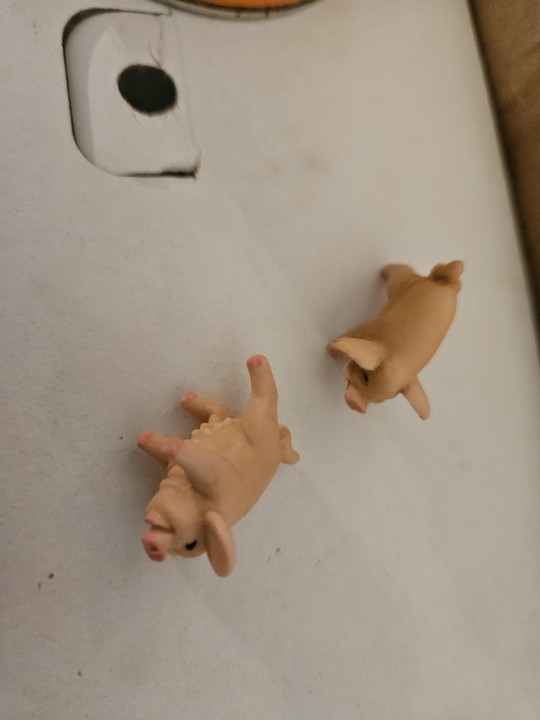
I love finding game pieces from old games and dreaming up RPGs that use them as the base mechanic.
Pig-Faced Orc RPG that uses your pig positions to determine outcomes.
Urban fantasy game like Demon: the Fallen or KULT but you play as one of those pigs that were possessed by Legion after Jesus exorcised that dude. You have been an immortal demoniac pig living among humanity for 2,000 years, plotting to subvert the Second Coming into an Aporkalypse with your pig powers and ability to hogjack anyone who has ever eaten bacon (Moses tried to warn you). Roll your pigs.
A blend of Paranoia and Amber Diceless based on the Death of Stalin and set after the events of Animal Farm. Napoleon has gone to the great people's abbatoir in the sky. The other pigs attempt power grabs, determining the success of their plots by the position of the legs in their pig pool. Two legs bad, four legs good. Unless...
54 notes
·
View notes
Text
I don't disagree that there's some level of congruence between filmgoers who defend narrow viewership by acting like it's a binary choice between watching the latest MCU film and watching black-and-white Eastern European art films about depression, and tabletop RPG players who defend narrow playership by acting like it's a binary choice between playing Dungeons & Dragons 5th Edition and playing one-page diceless storygames about gay catgirls smoking cigarettes.
The difference, of course, is that folks who advocate expanding one's cinematic horizons are rarely advocating going straight from watching the latest MCU film to watching black-and-while Eastern European art films about depression, whereas folks who advocate expanding one's tabletop roleplaying horizons very often are, in fact, advocating going straight from playing Dungeons & Dragons 5th Edition to playing one-page diceless storygames about gay catgirls smoking cigarettes.
4K notes
·
View notes
Note
ik doing game recs isnt your forte but this seems worth a shot since its relevant to some things you do talk about. Are there any non-dnd games youd recommend to someone coming into rpgs whos less confident in freeform RP but more familiar with tt war n skirmish games?
Ik its one of those things where dnd might on paper be an actual suggestion but in practice its like ive seen you say where every group seems to want to ignore most stats and especially in combat try and make ""theatre of the mind"" work when it feels like its be easier to all involved if we just dropped some little guys on some graph paper but everyone seems desperate to avoid that
Yeah, if you're coming from the direction of tabletop wargames and skirmish games then yeah D&D would actually work. But I think there are other good options if you want a game that's explicitly about moving dudes on a grid and doesn't pretend otherwise (I have a huge rant in my back pocket about "theater of the mind" and how it's actually one of the biggest lies ever concocted by D&D's designers and the fact that the player base has bought that lie is maddening, MADDENING I SAY).
First of all, I'm going to hype up Tactiquest by @level2janitor again. It's a game very clearly inspired by D&D in its genre and it's a very neat RPG that is very much about teams of fantasy folks hitting each other on the grid. The current playtest edition is also completely free!
Beacon is a tactical fantasy RPG that is basically like. What if we took the mech combat of Lancer and made the mechs fantasy RPG characters instead? It's a very tactically deep RPG with a sort of a Final Fantasy meets D&D vibe to its setting, and there's a lot to love there.
Speaking of Lancer, there's also ICON by one of the creators of Lancer. Also grid-based, also heavily about tactical combat. Very cool presentation. Yeah
And finally, Trespasser: Dark Fantasy Tactics. This one is fun because it combines so many influences from all around the tabletop RPG space: there's a bit of Dungeon Crawl Classics, 4e, there's domain management, there's a pretty clear campaign framework to follow. It's filled to the brim with so much cool stuff I really hope to be able to take it out for a spin some day.
58 notes
·
View notes
Text
TTRPGs suitable for: Play by Post!
My first ten or so years of role-playing were purely play-by-post: warrior cats and dragons adventuring on online forums and message boards (shout out to Darkflame the dragon and Coldstone the kitty.) There was one very memorable Fallen London role-play over email too!
I suppose the modern equivalent would be a game in DMs, or maybe a discord text channel. In any case, for various reasons, many people prefer to play games in written form! However, some game systems are difficult to utilise in this format.
Here are some games that make for wonderful text-based adventures. All are GMless and/or diceless, so there's no awkward halt while you wait for a GM's roll.
Chuubo's Marvelous Wish-Granting Engine is a diceless game I've been waiting to get my greedy little hands on for some time. It focuses on fantastical slice-of-life stories. This reddit thread has great advice for running it as a play-by-post game!
There are plenty of available adventures for this system too! Adventures such as To Rob Death's Dominion, A Pawn's Gambit and the creator's own Halloween Special.
For the Grail is a GMless and diceless game of Arthurian knights on a grand quest. While it was designed for physical play, I've been playing it online with a group of friends and it's a lot of fun!
Law Bringers is a diceless game designed for space fantasy adventures such as Star Wars, but which works well for pseudo-medieval fantasy as well. It's also completely free!
Lordsworn is a GMless rpg of tragic, broken warriors struggling to survive after the destruction of their god in a cataclysmic war. It uses 4-sided dice. When a player rolls these dice, they keep their results secret from the other players, making it perfect for this style of play. Each player controls three Lordsworn, providing a good variety of dynamics to explore during their travels.
Magica is a one-page rpg about magical girls. It is GMless but players use six-sided dice to resolve events. Also, each magical girl is secretly in love with one of the others. Messy fun indeed!
Feel free to reblog with examples of your own!
16 notes
·
View notes